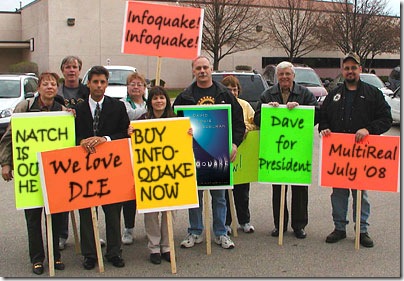We often latch on to the authors we love. We realize this is a tough business, and we don’t want them to starve. We want them fat and happy, sitting on cushions stuffed with hundred dollar bills. But what’s the best way to help them?
People who aren’t in the writing and publishing business often have skewed ideas of how the business works. I’ve had to educate more than one eager friend or family member who thought the best way to promote Infoquake was to walk into Barnes & Noble and turn the book facing out on the shelf so it covers up David Eddings’ titles next door. I tell them to please stop doing this, because David Eddings sends armed hooligans to ding up my car with cricket bats every time he finds one of my books in front of his.
So now let me educate you, o blog reader, on some ways you can help pimp your favorite author, and some ways you should not pimp your favorite author.

Do…
…buy the author’s books. That’s the first and most obvious thing you can do. There’s really no need to analyze strategically which venue you should buy an author’s books from. We’re generally not so particular where you pick them up or for what price. Just buy ’em, and read ’em.
…buy the author’s books at their preferred venue, if you have the choice. The foregoing notwithstanding, many authors would be happy to see you buy their books from a specific venue, if it’s all the same to you. What is the author’s preferred venue? It varies. Check the author’s website (assuming they have one) to see if they have something other than the standard Amazon button listed. Lots of authors like to champion independent stores like Clarkesworld, Mysterious Galaxy, and Powell’s. Rob Sawyer politely pushes you to buy autographed copies on his eBay store.
…tell your circle of friends and acquaintances about the author’s work. Duh. Word of mouth is the absolute number one way that most books are sold these days. So aside from buying the book, the most important thing you can do to promote your favorite author is to put your mouth to work for them. Don’t feel like you need to compose a detailed essay or review; don’t be pushy or intimidating. Just spread the word, one person at a time. I’ve had people tell me how they sent emails to a groups of their friends, and then some of those people go off and email a group of their friends. It snowballs.
…use social networking tools like Digg, StumbleUpon, MySpace, and LibraryThing. See all those little funky icons at the bottom of blog posts all over the web? They lead to social networking sites that can seriously boost an author’s web traffic (and consequently, their visibility and sales). I got a surprise jump in traffic from someone who listed my post on The Return of the King on StumbleUpon. (Here’s the StumbleUpon page.) How big a jump? About 14,000 visitors in the space of a few days. That’s 14,000 potential new readers who might not have heard of me before.
…write a positive Amazon review. Don’t worry too much about the other specialty book sites out there; people may buy books from a number of different online venues, but they go to the Amazon reviews to hear the buzz. Keep in mind that generic two-line five-star reviews with no content (“David Lewis Edleman Rulez!!!!!!!”) and reviews that are obviously from friends and family (“Even if David Louis Edelman hadn’t donated a kidney to my sick child, I still would recommend his books!”) don’t help. Thoughtful critiques that don’t just summarize plot or shovel out meaningless platitudes — even critiques that contain negative impressions — are much more persuasive.
…write about the author on your own site(s) and link to the author’s website. Got a blog or a website? It may seem like a no-brainer to write reviews of your author’s favorite works. But linking to the author’s website helps in a number of other, less visible ways: with Technorati ratings, with Google rankings, with Alexa rankings, etc. Not to mention having your favorite author’s name linked on your site is a constant tickler to your web visitors, who may be inclined to purchase something on your recommendation, but who might not always remember the name of the author you recommended.
…join the author’s mailing list. Yes, lots of people get their information from RSS feeds and Tumblelogs and Facebook updates and the like. But believe it or not, email is still far and away the number one driver of Internet traffic. Some authors just send out ticklers with release dates and upcoming events; others really put their heart into it. But mailing lists give authors a simple way to get in touch with their readers all in one pop. Fellow Pyr author Kay Kenyon has a dynamite newsletter wherein she dispenses writing tips and little mini-essays about her fiction, if you’re looking for a good example. (Here’s the signup for my mailing list, if you’re interested. Just sayin’.)